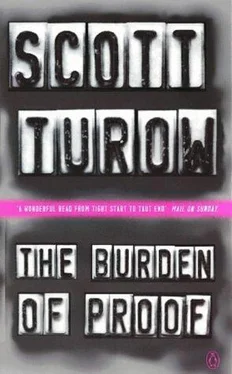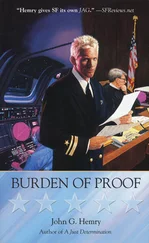Scott Turow - The Burden of Proof
Здесь есть возможность читать онлайн «Scott Turow - The Burden of Proof» весь текст электронной книги совершенно бесплатно (целиком полную версию без сокращений). В некоторых случаях можно слушать аудио, скачать через торрент в формате fb2 и присутствует краткое содержание. Жанр: Детектив, на английском языке. Описание произведения, (предисловие) а так же отзывы посетителей доступны на портале библиотеки ЛибКат.
- Название:The Burden of Proof
- Автор:
- Жанр:
- Год:неизвестен
- ISBN:нет данных
- Рейтинг книги:3 / 5. Голосов: 1
-
Избранное:Добавить в избранное
- Отзывы:
-
Ваша оценка:
- 60
- 1
- 2
- 3
- 4
- 5
The Burden of Proof: краткое содержание, описание и аннотация
Предлагаем к чтению аннотацию, описание, краткое содержание или предисловие (зависит от того, что написал сам автор книги «The Burden of Proof»). Если вы не нашли необходимую информацию о книге — напишите в комментариях, мы постараемся отыскать её.
The Burden of Proof — читать онлайн бесплатно полную книгу (весь текст) целиком
Ниже представлен текст книги, разбитый по страницам. Система сохранения места последней прочитанной страницы, позволяет с удобством читать онлайн бесплатно книгу «The Burden of Proof», без необходимости каждый раз заново искать на чём Вы остановились. Поставьте закладку, и сможете в любой момент перейти на страницу, на которой закончили чтение.
Интервал:
Закладка:
"We can't use these," Mittler said. "Pauline and I."
Symphony tickets. He held them forth. "I'm sure Clara would like to go." Stern was too dumbfounded for Mittler to take any chances. "You know," he said, "Clara put me up to this.
She was too bashful to ask herself."
"This is very kind, Mr. Mittler. I am most pleased."
"Sure you are," said Henry. "Look,! have no goddamned judgment about my daughter, Stern. I don't know if this is the right thing to do or not. You may think she's bright, but she has no idea of what she's up to half the time. Believe me. I assured her mother there would be no problem here. I told her you were harmless." Mittler's eyes had a yellowish cast and he fixed Stern directly.
Should he have turned away? Decades later, in the depths of grief, he could pose the question, but he would never damn them both with an affirmative response. He had taken the two tickets from Henry's hand, while answering the assessment of his harmlessness in a murmur. Anyone listening would have thought he had agreed.
As soon as Peter laid eyes on him, Stern could tell that his son was unsettled. It was a familiar look, 1, something not too far from panic, which, in a blink was put aside by the work of adult will. Peter glanced about his reception room seeking to determine who else was present, and then asked quietly, "What's wrong?" Stern had never been to his son's office. While Peter was a resident, Clara and Stern had met him for dinner once or twice in the university hospitalcafeteria. In his green togs, with his stethoscope lumped into a pocket, he seemed vital, smart, remarkably at ease.
Peter's mastery of his place had 'ty, Stern feared that his eviction was about to be consummated, but he could tell at once, from the way Henry groused and pawed about,' that he had something else on his mind. If Henry were revoking a license at will, he would do it without hesitation.
"We can't use these," Mittler said. "Pauline and I."
Symphony tickets. He held them forth. "I'm sure Clara would like to go." Stern was too dumbfounded for Mittler to take any chances. "You know," he said, "Clara put me up to this.
She was too bashful to ask herself."
"This is very kind, Mr. Mittler. I am most pleased."
"Sure you are," said Henry. "Look,! have no goddamned judgment about my daughter, Stern. I don't know if this is the right thing to do or not. You may think she's bright, but she has no idea of what she's up to half the time. Believe me. I assured her mother there would be no problem here. I told her you were harmless." Mittler's eyes had a yellowish cast and he fixed Stern directly.
Should he have turned away? Decades later, in the depths of grief, he could pose the question, but he would never damn them both with an affirmative response. He had taken the two tickets from Henry's hand, while answering the assessment of his harmlessness in a murmur. Anyone listening would have thought he had agreed.
As soon as Peter laid eyes on him, Stern could tell that his son was unsettled. It was a familiar look, 1, something not too far from panic, which, in a blink was put aside by the work of adult will. Peter glanced about his reception room seeking to determine who else was present, and then asked quietly, "What's wrong?" Stern had never been to his son's office. While Peter was a resident, Clara and Stern had met him for dinner once or twice in the university hospitalcafeteria. In his green togs, with his stethoscope lumped into a pocket, he seemed vital, smart, remarkably at ease.
Peter's mastery of his place had 'touched Stern; he was happy for his son, who was so often overwrought. But apparently the meetings had not been as comfortable for Peter. In the year and a half he had been in private practice, he had never invited his father to come by.
Clara, certainly, had been here for lunch. But Stern had wandered around the suburban office center today for sometime looking for the place, a smaller HMO, feeling various qualms, certain that at any instant impatience and anxiety would lead him to turn around. They had not.
Unfortunately, there were real needs here, a genuine quandary.
"I require your advice on a matter," Stern told his son.
"Something somewhat delicate."
At a loss, Peter took him back through a warren of garishly painted corridors to a small office, not much bigger than a cubicle. In these surroundings, Peter had largely surrendered to the mundane. His desk was clean, dustless, occupied by only a few odds and ends supplied by the drug companies: an onyx pen set, an oetagonai plastic thing which turned out to be a calendar. There was some grass cloth on one wail, an unimpressive silkscreen; his diplomas were lined up typically along one plaster column, On the top bookshelf, Stern saw the only photograph in the office, a small oval-framed picture of Clara taken a few years ago.
A recent addition, probably. Grown men of Peter's generation did not display their mothers' photos, even that discreetly, while they lived.
"So what is this?" Peter asked. "Are you all right?"
"Generally," said Stern.
"Kate said Claudia told her that you don't show up some mornings."
Stern had no idea his daughter and his secretary spoke. It was touching that they took it upon themselves to communicate about his well-beingmand typical of Peter that their secret would be casually betrayed. Stern had missed the remainder of the day after seeing Radczyk,.and yesterday, Monday, as well. Even today, he had not been certain he could rouse himself. But he had not come here seeking sympathy. He said simply that he was as well as could be expected, and Peter nodded. Amenities passed, his son was not obliged to inquire further.
And would he have answered if Peter had? Stern, pointed by his son to a small upholstered chair, settled in it with a certain morose heaviness.
No, he would not have. Somewhere in Stern's heart there was a perfect Peter, the son whom every man wanted, full of ready unspeaking sympathies, and inclinations in all matters of consequence exactly like his father's. But this figure was no more than a shadow, so removed from every day that he did not even have an imagined form. Stern dealt with the real man as best he could. He respected Peter's abilities; he was bright-always the star student-and meanly Clever. Like the women, Stern was willing to call on Peter when he was in need. But he was unwilling-unable-to yield something in return.
That was the truth. Have it. Peter reacted; Stern sat like a stone. It was all as it would ever be.
"Is it something else with Mom's will?"
"No," said Stern. He could hear the impatience in his voice, but Peter virtually demanded that his father state his business. Here, the dispenser of treatment and knowledge, his son was sovereign. This was clearly an unwelcome invasion.
"There are questions, Peter, which I need to put to someone. I mast your discretion."
"Medical questions, you mean?" As he asked, Peter moved behind his desk, the dashing young doctor, with his centerparted hair and long white coat. Even considering Kate, it was possible that Peter was the best-looking of the children. He appeared to be in peak physical condition, razor-thin and athletic.
"Yes. Medical questions. Technical questions."
"What happened to Nate?"
A reasonable inquiry. Stern himself had spent the weekend phoning Nate, who remained the first choice as medical adviser. But Dr. Cawley's personal life appeared to have rendered him as unreliable as a teenager, and Stern had tired of leaving messages.
"This is a matter with a contemporary flavor, Peter. I presumed that I could bother you. If another time would be preferable-"
Peter waved off the suggestion. "I was just wondering. So what is it?"
Stern felt his mouth drawing, preconsciously. 'Various cycles of discomfort started up in different regions of his body. Yet he was determined to proceed. The fact was he required information, not just to feed a grisly appetite for knowledge, but also because it had dawned on him over the weekend that his own well'being might be in doubt.
Читать дальшеИнтервал:
Закладка:
Похожие книги на «The Burden of Proof»
Представляем Вашему вниманию похожие книги на «The Burden of Proof» списком для выбора. Мы отобрали схожую по названию и смыслу литературу в надежде предоставить читателям больше вариантов отыскать новые, интересные, ещё непрочитанные произведения.
Обсуждение, отзывы о книге «The Burden of Proof» и просто собственные мнения читателей. Оставьте ваши комментарии, напишите, что Вы думаете о произведении, его смысле или главных героях. Укажите что конкретно понравилось, а что нет, и почему Вы так считаете.












